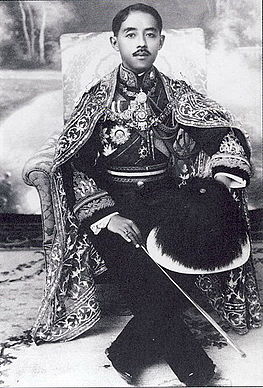His Royal Highness Field Marshal
Prince Chakrabongse Bhuvanadh, Prince of Phitsanulok

|
His Royal Highness Field Marshal Prince Chakrabongse Bhuvanadh, Prince of Phitsanulok, was born in the Grand Palace on Saturday 3 March 1883. He was the 40th child of His Majesty King Chulalongkorn and the fourth child of Her Majesty Queen Sri Bajarindra. When he was young, the Prince studied Thai subject with Phraya Si Sunthon Woharn (Noi) and Khun Bumnan Worawat (Singhto) in the Grand Palace. Later, Rajakumara School was founded in the Grand Palace, and the Prince continued his studies of both Thai and English languages here. In 1896, His Majesty granted a royal permission for the Prince, aged 14, to study abroad in Europe. He was accompanied by His Royal Highness Field Marshal Prince Bhanurangsi Savangwongse, Prince Banubandhu Vongsevoradej, during this trip and then began his studies in the Great Britain. In 1897, His Majesty made a royal visit to Europe and graciously commissioned the Prince to the army officer of the Royal Thai Army while studying in the Great Britain. In June 1898, the Prince traveled to Russia to further his education at a military academy, following an invitation from His Imperial Majesty the Tzar Nicolas II of Russia to His Majesty King Chulalongkorn, and was received with honor. The Commandant of Pages Corps and Captain of the Chevalier Guard Regiment were assigned as to assist the Prince in his studies and to facilitate all matters. His Imperial Majesty ordered the Prince to continue his education at Pages Corps, an army school of 9 educational levels. Since the Prince was required to pass the final exam within four years, he had to study some subjects in primary educational levels with the arranged tutors in his palace in order to enroll in level 6 right away. The Prince subsequently enrolled in level 6 and later, finished level 9 in the first place in 1902. Afterwards, he attended a military college and again, finished in the first place in 1905. His Imperial Majesty was very impressed, and therefore, promoted the Prince to the rank of Colonel of the Imperial Russian Army and assigned him the position of Special Officer in the Hussar Regiment of His Imperial Majesty. In addition, His Imperial Majesty bestowed the sash of the Order of St. Andrew the Apostle the First-Called, the highest order of chivalry of the Russian Empire, as well as the badge of the Order of Saint Vladimir on him. While in Russia, the Prince got married with a Russian nurse named Ekaterina Desnitskaya and later had a son, His Royal Highness Prince Chula Chakrabongse. After graduating from Russia, the Prince began his military career as Assistant Commander of Joint Defence Regiment, Ministry of Defence in 1906, and was later assigned an additional position of Commandant of Army Cadet School in the same year. In 1909, he was promoted to Royal Thai Army Chief of Staff and until June 1913, also acted as Director of Education and Training of the Royal Thai Army (former Army Cadet School). In 1910, Commanding Officer of the 1st Infantry Regiment, King’s Guard, became one of his positions. As Royal Thai Army Chief of Staff, which an important position concerning combat, the Prince had reformed various matters concerning command and staff. He initiated the idea of founding Command and General Staff College to prepare officers for command and staff posts, and outlined the programs for the School and the process of officer admission to the College. Moreover, he compiled a textbook called “The Chronicle of Strategic Art (พงศาวดารยุทธศิลปะ)” as well as many documents to be used as textbooks in the initial phase of the Command and General Staff College. These reforms have been used as development guidelines for the Command and General Staff College until the present day. In 1917, with the Prince’s great vision, the military development had progressed rapidly that air force officers were successfully sent to join the First World War in Europe as His Majesty King Vajiravudh’s royal order. In 1918, the Prince founded the Army Air Corps which has later become the present Royal Thai Air Force, and initiated the construction of Fort Chakrabongse in Prachin Buri. In 1919, he ordered the trial fight carrying mail bags to Chantaburi and flying around for the people to see with the satisfactory outcome. According to the remark of the Prince, “the air power is truly the sole protecting shield that prevents the outbreak of wars into the heart of the country and also yields the benefits in transportation during peacetime.” It has been considered that the Prince had created the basis for Thailand’s air power development until there is Royal Thai Air Force today. From the biography of His Royal Highness Field Marshal Prince Chakrabongse Bhuvanadh, Prince of Phitsanulok, it can be seen that he had a remarkable ability in both education and military service. He was responsible for many burdens, and hardly found time to rest. On 4 June 1920, following a royal permission to take a vacation, the Prince along with his consort and his son traveled to the west coast. However, just after a day of travelling, he suffered tremendously from high fever on the way to his destination. On 8 June, his condition became more severe. At last, the Prince passed away at the age of 38 years, 3 months, and 10 days, on 13 June 1920 at 13.50 hours. |
